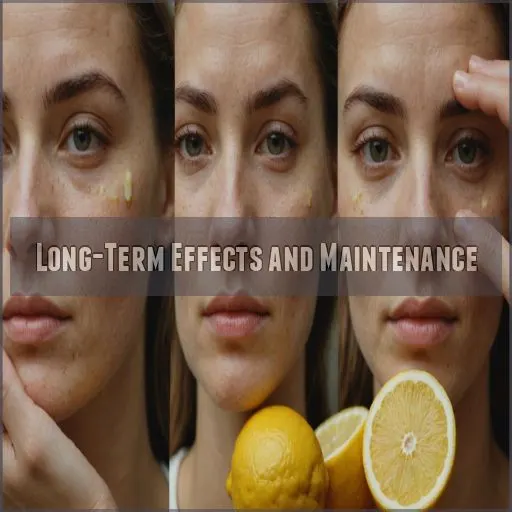This site is supported by our readers. We may earn a commission, at no cost to you, if you purchase through links.
 Thinking about using lemon juice for skin lightening? It’s like the Swiss Army knife of the skincare world—packed with citric acid to fade dark spots and vitamin C to dial down melanin.
Thinking about using lemon juice for skin lightening? It’s like the Swiss Army knife of the skincare world—packed with citric acid to fade dark spots and vitamin C to dial down melanin.
But don’t go squeezing lemons willy-nilly! They can make your skin a sun magnet, so don’t forget your sunscreen or your skin might feel like toast at the beach.
Mix with honey or yogurt for a calmer concoction and always patch test to avoid any unexpected surprises. In the search for a radiant complexion, patience is your BFF—but who said beauty was meant to be easy?
Curious for more tips?
Table Of Contents
- Key Takeaways
- How Lemon Juice Works
- Preparing and Applying Lemon Juice
- Safety Precautions and Potential Side Effects
- Expected Results and Timeline
- Maintaining and Enhancing Results
- Combining Lemon Juice With Other Remedies
- Skin Whitening Treatments and Options
- Potential Risks and Contraindications
- Long-Term Effects and Maintenance
- Alternatives to Lemon Juice for Skin Whitening
- Frequently Asked Questions (FAQs)
- Can you lighten skin with lemon juice?
- Is lemon juice beneficial for age spots?
- How to use lemon juice for skin care?
- Is lemon juice good for whitening skin?
- What are some effective skin whitening home remedies?
- How does lemon contribute to skin whitening?
- Can I use milk for skin whitening?
- Does Wellaholic offer skin whitening treatments?
- How does Wellaholic guide individuals in their journey to skin whitening?
- Are the skin whitening treatments at Wellaholic suitable for all skin types?
- How long does it take for lemon to lighten skin?
- Is lemon juice good for skin whitening?
- What happens if I rub lemon on my face everyday?
- Will lemon lighten dark spots?
- How does lemon juice affect skin pH balance?
- Can lemon juice cause skin sensitivity to sunlight?
- Is lemon juice effective for acne scar reduction?
- What are signs of lemon juice skin irritation?
- Does lemon juice interact with other skincare products?
- Conclusion
Key Takeaways
- Thinking about using lemon juice for skin lightening? It’s powerful but tricky. Lemon juice acts like a double-edged sword—great for brightening dark spots, but it can also irritate your skin and make it sun-sensitive. So, proceed with caution!
- Mixing lemon juice with soothing ingredients like honey or yogurt can help reduce irritation. A patch test is your best friend here. Imagine trying on shoes in a store before buying them—let’s avoid those unexpected blisters, right?
- Consistency is key, but don’t overdo it. It takes time for results to show, and using lemon juice too often can be like squeezing too much toothpaste—a messy situation you’ll want to avoid. Give your skin some time and grace to adjust.
- Always wear sunscreen afterward. Lemon juice can make your skin more sensitive to sunlight, turning your face into a grumpy tomato if you’re not careful. Think of sunscreen as your skin’s invisible umbrella, perfect for avoiding unexpected burns.
How Lemon Juice Works
Discover how lemon juice works wonders for skin lightening with its natural bleaching agents, like citric acid properties, and vitamin C magic
. Just be careful not to mistake your face for a salad dressing!
Natural Bleaching Agents and Their Effects
Lemon juice can be a tempting natural bleaching agent for skin lightening, but tread lightly—it’s a bit of a wild card!
With properties like:
- Enhanced exfoliation for brighter skin.
- Citric acid tackling dark spots.
- Potential irritation if overused or exposed to sunlight.
Consider alternatives like cucumber or aloe vera for safer hyperpigmentation treatment.
Vitamin C and Melanin Production
You’re familiar with natural bleaching agents, so let’s add a splash of Vitamin C into the mix.
This powerful antioxidant found in lemon juice helps control melanin production, promoting skin brightening and an even skin tone . It acts like a traffic light, slowing down melanin’s darker hues.
| Benefit | Action | Result |
|---|---|---|
| Antioxidant | Inhibits tyrosinase | Brightens skin |
| Skin Protection | Slows darkening | Evens skin tone |
| Lightening Agent | Reduces pigmentation | Glowing complexion |
Exfoliating Properties and Skin Cell Growth
Your skin loves a fresh start, right? Embrace lemon juice’s exfoliating properties, promoting cell turnover and renewal.
Mix a touch with brown sugar for a gentle scrub, clearing dead skin and encouraging healthy growth.
While it can fade acne marks, remember: balance is key! A revitalizing routine awaits, revealing vibrant skin underneath.
Citric Acid and Its Role in Skin Lightening
Imagine your skin’s like the pages of a favorite book—citric acid from lemon juice acts as a soft eraser, gently lightening dark spots over time.
It’s like a mini chemical peel, exfoliating and encouraging fresh skin cells.
But, watch the sun! That same brightening agent can increase sun sensitivity, so brace your skin with protective alternatives or DIY masks.
Preparing and Applying Lemon Juice
Freshly squeezed lemon juice is the way to go for skin lightening – it packs the highest concentration of natural acids and vitamins.
But don’t just slap it on – mix it with other soothing ingredients like honey or aloe vera to minimize any potential irritation.
Choosing the Right Lemons for Skin Lightening
Selecting the right lemons is more art than science.
Opt for organic lemons to sidestep pesticide concerns, and pick ones that feel heavy for their size—signifying juiciness.
Store them in the fridge to keep them fresh.
Although tempting, remember lemon juice can irritate skin or react with UV radiation, making it a risky skin lightening choice .
Mixing Lemon Juice With Other Ingredients
Blending lemon juice with other ingredients can create a gentle concoction for skin lightening while minimizing irritation risks.
Try mixing:
- Lemon and honey: A sweet remedy for glowing skin.
- Lemon and yogurt: To soothe and pamper.
- Lemon and turmeric: A golden touch to brighten.
- Lemon and aloe vera: Hydration galore.
- Lemon and milk: For an illuminating finish.
Always patch test first!
Applying Lemon Juice to Clean and Dry Skin
Before you’re putting lemon juice on your skin, make sure your face is clean and dry.
To avoid irritation, dilute lemon juice with water. Gently apply using a cotton ball, focusing on areas needing lightening.
Don’t forget that results may vary based on skin type and application frequency. Always review patch test results for safety.
Safety Precautions for Sensitive Skin
Patch testing is key for sensitive skin. Before diving into lemon juice dreams, make sure no allergic reactions crop up. Dilute it with water or aloe vera for a gentle touch.
Consider using products with skin-soothing additives like aloe vera, chamomile, or oatmeal extract to help retain moisture and hydrate the skin.
Remember, sun sensitivity is a real kicker—avoid exposure after use. If potato slices sound more your style, give them a whirl for a milder glow.
Safety Precautions and Potential Side Effects
If you’re considering using lemon juice for skin lightening, it’s really important to be aware of the safety precautions and potential side effects.
Don’t skip the patch test—nobody wants to look like a lobster, and remember to slather on sunscreen to protect your newfound glow from UV rays.
Performing a Patch Test for Skin Sensitivity
You’re ready to try lemon juice for skin lightening?
First, do a patch test! Dab a little on your wrist or behind your ear—no one needs a lemony surprise mid-day.
Wait 24 hours. If you notice redness or itching, it’s a no-go.
Easy-peasy lemon squeezy, right? Your skin will thank you!
Protecting Skin From the Sun’s Harmful UV Rays
Lemon juice can make your skin more sensitive to the sun’s harmful UV rays.
This increases your risk of sunburn, blistering, and even long-term skin damage like premature aging and skin cancer.
To protect your skin, always apply a broad-spectrum sunscreen with an SPF of 30 or higher before going outside, even on cloudy days.
Minimizing Side Effects With Dilution and Soothing Ingredients
Before diving in with lemon juice, blend it with honey or yogurt to soften its citrus punch and prevent skin irritation.
Aloe vera can also soothe like a trusty sidekick. Think of it as giving your skin a gentle hug while taming ambition. A little creativity can keep your face happy, hydrated, and glowing.
Check out the table below:
| Dilution Techniques | Soothing Ingredients | Benefits |
|---|---|---|
| Mix with water | Aloe Vera | Reduces irritation |
| Add honey | Yogurt | Moisturizes skin |
| Use sparingly | Cucumber | Calms redness |
| Combine with milk | Green Tea | Soothes skin |
| Patch test first | Turmeric | Reduces swelling |
Keep your skin safe and fabulous!
Avoiding Open Wounds and Broken Skin
Keeping your skin on good terms means avoiding lemon juice on open wounds, so those cuts don’t come back to haunt you like a bad hair day.
- Apply lemon juice only to healed skin.
- Use soothing creams to promote skin healing.
- Keep wounds covered with a gentle touch.
Expected Results and Timeline
If you’re thinking about using lemon juice to lighten your skin, you’ve probably wondered how soon you’ll see results.
While you’ll notice a brighter complexion in just a couple of weeks, don’t expect miracles overnight.
Consistency is key for fading those stubborn spots.
Initial Improvement and Brightness
You may start noticing a glow boost to your skin tone after just a week of using lemon juice.
It’s like waking up one day and realizing your skin has that extra sparkle—a kind of complexion change that catches you off guard in a good way.
While results vary, many find brighter skin gives them a little extra pep in their step (Source).
Gradual Lightening of Dark Spots and Hyperpigmentation
It takes time for lemon juice to gradually lighten dark spots and hyperpigmentation, so patience is key.
A slight brightening of dark spots as melanin is gradually reduced, thanks to the vitamin C in lemon juice which inhibits melanin production.
This natural skin-lightening process can be enhanced by combining lemon juice with other ingredients, such as honey and lemon juice masks.
More even skin tone after consistent application.
Temporary tingling or mild irritation, so remember to patch test first.
Using this natural remedy feels like nurturing your skin with nature’s gentle glow.
Factors Influencing Results and Treatment Duration
When using lemon juice for skin lightening, you’re in the driver’s seat, but results vary based on skin type, pigmentation severity, and application frequency.
Each person’s unique response and the product’s quality matter. It’s like baking cookies; sometimes, the recipe needs tweaking.
If you’re mixing too much or too little, patience and adjustments are key ingredients for a brighter complexion.
Maintaining and Enhancing Results
Maintaining a consistent skincare routine and complementing lemon juice with other natural remedies can help you sustain and enhance your skin lightening results, especially when using a top-rated Korean exfoliator
.
Avoid harsh products, limit sun exposure, and consider combining lemon juice with ingredients like aloe vera or turmeric for a more thorough approach.
Establishing a Regular Skincare Routine
To maintain your skin’s radiance after using lemon juice, embrace a regular skincare routine.
Start with cleansing products made for your skin type and add a light, non-comedogenic moisturizer.
Apply sunscreen daily to combat UV damage.
Consistency is key; exfoliate weekly for a clearer complexion.
Make it a ritual—your skin will thank you!
Complementing Lemon Juice With Natural Remedies
Looking to spice up your skin care? Mix lemon juice with gentle pals like turmeric, honey, or yogurt. These help lighten skin without the drama of irritation or sunburn.
Consider these combos:
- Turmeric and Honey: Add a golden touch.
- Yogurt and Papaya: Smooth and brighten.
- Aloe Vera: Soothe and hydrate naturally.
Avoiding Harsh Skin Care Products and Treatments
Pairing lemon juice with natural remedies can be tantalizing, but steer clear of harsh skin care products.
Gentle cleansing with DIY alternatives reduces skin irritation. Think of your skin like a delicate plant—nourish it without overwatering.
Seek professional advice when needed, avoiding products promising miracles, as they might deliver more woes than wows (Source).
Limiting Excessive Sun Exposure
Regarding lemon juice and sunlight, too much of a good thing can backfire! Protect your skin with these bright ideas:
- Use sunscreen to block harmful UV rays.
- Wear sun hats for added shade.
- Stay indoors during peak sunlight hours.
Balance is key to keeping your skin glowing and safe.
Combining Lemon Juice With Other Remedies
If you’re looking to brighten your skin, combining lemon juice with other natural remedies can supercharge your results.
Think of this as inviting lemon juice to a cozy party with aloe vera, turmeric, milk, and even potato slices—they’re all here to help brighten your day and your skin!
Aloe Vera for Soothing and Hydrating the Skin
Aloe vera has become a beloved ally for soothing and hydrating skin. With its cooling touch, it offers sunburn relief and boosts skin moisture.
Try applying aloe vera gel after cleansing for a nice feel. Don’t forget to test a small area first to avoid surprises.
| Aloe Vera Benefits | Skin Potential |
|---|---|
| Hydration | High |
| Sunburn Relief | Immediate |
| Moisture Lock | Effective |
| DIY Masks | Popular |
| Allergy Risk | Test First |
Turmeric for Antioxidant and Anti-Inflammatory Properties
Turmeric’s antioxidant and anti-inflammatory properties make it a powerful ally when combined with lemon juice for skin lightening.
Whip up a soothing turmeric face mask by mixing it with a bit of honey and yogurt.
The curcumin in turmeric can help calm inflammation and even out skin tone .
Milk for Exfoliating and Lightening the Skin
Switching gears from turmeric’s glow, let’s milk it for all it’s worth!
Milk can gently exfoliate your skin thanks to lactic acid, sloughing off dead cells without fuss.
While you won’t transform overnight, this skin-lightening milk approach might be your glass half-full in a beauty routine.
Just don’t cry over spilled bath milk!
Potato Slices for Enzyme-Based Skin Lightening
Ever thought potatoes could help with skin brightening? Some folks believe the enzymes in potatoes, like catecholase, might naturally lighten skin, though research is lacking (Source).
For a DIY mask, blend potato juice with honey or yogurt for added benefits.
Remember, natural solutions are worth exploring, but results can vary. Patience and consistency are key!
Skin Whitening Treatments and Options
If you’re thinking about skin whitening treatments, you’ve got more options than ice cream flavors in summer.
From professional treatments to easy DIY methods like using lemon juice, each option has its own benefits and considerations for your unique skin type.
Professional Treatments for Skin Whitening
If lemon juice isn’t cutting the mustard, professional skin whitening treatments might be your cup of tea.
These treatments can include:
- Laser Treatments: Zapping away dark spots like a sci-fi hero.
- Chemical Peels: Shedding your old skin like a snake, revealing a brighter layer.
- Microneedling: Stimulating your skin to regenerate itself.
- Skin Bleaching Creams: Fading spots with dermatologist-prescribed strength.
Always consult a professional.
Choosing the Right Treatment for Your Skin Type
When selecting the right treatment for your skin type, consider what suits your unique skin sensitivity and treatment goals.
Finding the perfect fit between DIY adventures and professional options involves balancing budget constraints and potential side effect risks.
Like finding the right pair of shoes, it’s all about comfort and style—a little humor for your skin!
Carefully evaluate to make sure it aligns with your beauty aspirations .
Considering At-Home Remedies and DIY Treatments
Considering at-home remedies for skin lightening? You’re not alone!
DIY skincare with natural remedies like lemon juice might seem tempting, but beware its acidic nature can spark more trouble than desired, leading to irritation and even burns.
Instead, explore home treatments using cucumber or aloe vera, which offer simple solutions without the risks.
Keep your skin—and your sanity—intact!
Potential Risks and Contraindications
While lemon juice can work wonders for skin lightening, it’s essential to exercise caution.
Perform a patch test first to check for any adverse reactions, and avoid using it on sensitive or broken skin.
Moderation is key, as excessive use can lead to irritation and increased sun sensitivity.
Skin Irritation and Allergic Reactions
While exploring lemon juice for skin lightening, keep skin irritation and allergies on your radar. You don’t want your face turning redder than a tomato at a comedy show!
To keep your skin happy:
- Patch test first.
- Avoid common irritants.
- Use soothing remedies.
- Consult for allergy management.
Stay savvy, beautiful, and rash-free!
Increased Sensitivity to the Sun’s UV Rays
Sunshine and lemon juice are like oil and water—they just don’t mix well.
Using lemon juice on your skin can make you more sensitive to the sun, increasing the risk of sunburn and skin damage.
It’s like telling secrets to a gossip—it’ll come back to bite you.
Always use sunscreen and seek shade.
Interactions With Other Skin Care Products
Mixing lemon juice with other skincare products is like walking a tightrope: proceed with caution!
Its acidity can clash with certain ingredients, leading to skin irritation or unexpected reactions.
Be mindful of product compatibility and ingredient mixing. Stick to gentle pairings and check for potential reactions to keep your skin safe and radiant .
Precautions for Pregnant or Breastfeeding Women
Before you treat your skin with lemon juice, think twice, especially if you’re pregnant or breastfeeding.
The strong acidity can irritate your skin and increase sensitivity to the sun, raising safety concerns .
Consider alternative treatments and consult your doctor for advice.
They can guide you to safer options that won’t leave you in a pickle.
Long-Term Effects and Maintenance
Maintaining your skin’s newfound brightness with lemon juice requires a thoughtful, steady approach, like caring for a delicate plant.
Don’t let those dark spots sneak back in for an encore; tweak your routine as needed and keep an eye on your progress so you can adjust your skin-lightening game plan.
This will help you keep an eye on your progress and make necessary adjustments to maintain the desired results.
Sustaining Results With Consistent Application
To maintain those bright, youthful results from using lemon juice, it’s essential to stick to a consistent skincare routine.
Daily application of lemon juice, when diluted and used with care, can offer long-term benefits.
Don’t forget your trusty sidekick, sunscreen; it’s really important to shield your skin from UV rays that can undo your hard work.
Preventing Re-Darkening of the Skin
Maintaining bright skin isn’t just about initial treatments, but also about preventing re-darkening as life goes on.
Regular sunscreen use is your best defense, protecting against UV rays that trigger melanin production and potentially causing hyperpigmentation prevention.
It’s also essential to choose the right moisturizer, especially for melanin-rich skin that’s prone to dryness and ashiness. Consider these lifestyle tweaks to keep your skin healthy:
- Apply sunscreen daily
- Follow gentle skincare habits
- Embrace melanin-control strategies.
Adjusting Treatment Duration and Frequency
You might feel tempted to splash lemon juice daily, but less is more because of sensitivity.
Adjust your frequency based on your skin type and desired results.
| Skin Type | Frequency | Note |
|---|---|---|
| Oily | 1-2 times/week | Monitor for dryness |
| Dry | Once a week | Hydrate after use |
| Sensitive | Every other week | Patch test first |
Choose wisely and find your glow!
Monitoring Progress and Adjusting the Treatment Plan
Now that you’ve adjusted the treatment duration, it’s time to keep an eye on those changes.
Notice any skin tone changes? If so, tweak your routine based on results and expectations.
Are signs of sensitivity making an appearance? Don’t hesitate to switch gears and adjust products.
Remember, keeping a balanced approach makes your skin feel fabulous and look radiant.
Alternatives to Lemon Juice for Skin Whitening
If you’re looking to brighten your skin but lemon juice isn’t your thing, you’ve got alternatives that don’t sting like a fresh paper cut.
From chemical-based creams to gentle home remedies, there’s a wide range of options that promise to leave you glowing and not stinging like you’ve wrestled with a citrus fruit.
Chemical-Based Skin Whitening Products
Chemical-based skin whitening products can be a mixed bag.
Their effectiveness often hinges on ingredients like hydroquinone and retinoids, which must be used with caution due to potential side effects such as skin irritation or, in worst cases, mercury exposure .
Always scrutinize the label and consult a dermatologist to make sure safety is prioritized over cost-saving alternatives.
Natural Alternatives to Lemon Juice
Looking for natural alternatives to lemon juice for skin lightening? Say goodbye to harsh acidity with gentler options that brighten your skin!
Try:
- Aloe vera for soothing hydration
- Cucumber slices to refresh and lighten
- Green tea for antioxidant-rich care
- Yogurt masks to gently exfoliate
- Potatoes for enzyme-based brightening
These DIY remedies help maintain a radiant skin care routine.
Professional Treatments and Chemical Peels
If lemon juice isn’t cutting it, professional chemical peels could be the answer.
These treatments use potent acids to deeply exfoliate and resurface the skin, fading dark spots and discoloration more effectively than DIY remedies.
Just be prepared for some downtime – peels can cause redness, peeling, and sensitivity for up to a week, which can be a significant amount of downtime.
Combining Remedies for Enhanced Results
To turbocharge your skin’s radiance, pair lemon juice with nature’s wonders like honey for hydration, turmeric for a glowing touch, or yogurt to harness probiotics.
Try papaya’s enzymes for exfoliation or soothing aloe vera.
Aloe and lemon—quite the dynamic duo—bring a natural touch to beauty routines, making your skin feel like it took a mini-vacation!
Frequently Asked Questions (FAQs)
Can you lighten skin with lemon juice?
You can use lemon juice to lighten skin due to its natural acids, but it’s risky.
It may cause irritation, sun sensitivity, or white spots instead.
Always patch test and consult your dermatologist.
Is lemon juice beneficial for age spots?
Lemon juice can lighten age spots due to its vitamin C and citric acid.
However, it may also irritate your skin and increase sun sensitivity.
Test it cautiously, dilute with water, and avoid sun exposure afterward.
How to use lemon juice for skin care?
When using lemon juice for skin care, dilute it with water to reduce irritation.
Apply cautiously with a cotton ball, avoiding sun exposure to prevent burns.
Always do a patch test first to check for sensitivity.
Is lemon juice good for whitening skin?
Hold up there, partner!
While lemon juice may seem like a quick fix for brighter skin, it’s a risky road to go down.
Tread carefully, as it can cause irritation, sunburns, and even skin conditions like vitiligo.
Why not try some safer natural alternatives instead?
What are some effective skin whitening home remedies?
Effective skin whitening home remedies include using natural ingredients like yogurt, honey, and turmeric, like those used in natural upper lip hair removal
.
These lighten your skin gently by reducing pigmentation without harsh chemicals.
Consistency is key, and results take time, so patience pays off!
How does lemon contribute to skin whitening?
Lemon juice can lighten skin due to its citric and ascorbic acids, which reduce dark spots by exfoliating and slightly bleaching the skin.
However, beware of irritation and sensitivity, especially if you’ve got sensitive skin.
Can I use milk for skin whitening?
Did you know Cleopatra swore by milk baths? While milk’s lactic acid offers gentle exfoliation, science hasn’t confirmed its power for skin whitening.
It’s like hoping for a miracle from your morning coffee.
Focus on proven treatments! .
Does Wellaholic offer skin whitening treatments?
Wellaholic offers skin whitening treatments using AfterGlow Red Light Therapy.
These treatments are designed for sensitive skin, are gentle, and can help with dark spots and uneven tone.
How does Wellaholic guide individuals in their journey to skin whitening?
Start your skin whitening journey with Wellaholic.
They guide you using AfterGlow Red Light Therapy to reduce melanin concentration and enhance collagen production.
This treatment makes your skin brighter and more youthful.
Are the skin whitening treatments at Wellaholic suitable for all skin types?
Explore the suitability of Wellaholic’s skin whitening treatments across diverse skin types.
While generally effective, individual results may vary due to varying skin reactions.
It’s best to consult with professionals for personalized advice specific to your skin type.
How long does it take for lemon to lighten skin?
Using lemon juice to lighten skin can take 4-6 weeks with consistent application.
It may cause irritation and increased sun sensitivity.
Consult a dermatologist for safer, more effective skin brightening options suited to your unique skin type.
Is lemon juice good for skin whitening?
Picture a lemon’s zing as the sun’s harsh rays.
While it may lighten skin over time, it risks irritation, redness, and increased sun-sensitivity.
Looking for glow? Safer options include cucumber or aloe vera.
What happens if I rub lemon on my face everyday?
Rubbing lemon on your face daily might irritate or cause dryness, redness, or even blistering due to its acidity.
It also increases sunburn risk.
Always test first and dilute with water to minimize side effects.
Will lemon lighten dark spots?
Thinking about turning your skin into a Monet-esque portfolio of soft, luminescent hues?
Lemon might help lighten dark spots slowly, but it can irritate and cause sun sensitivity.
Try safer alternatives for predictable, fab results.
How does lemon juice affect skin pH balance?
Lemon juice, with its low pH of around 2-3, can disrupt your skin’s natural pH balance of about
This disruption can potentially cause irritation, hyperpigmentation, and sensitivity to sunlight.
Use cautiously to avoid these effects.
Can lemon juice cause skin sensitivity to sunlight?
Stepping into the sunlight after squeezing a lemon isn’t always a walk in the park.
Lemon juice contains psoralens, which can make your skin more sensitive to sunlight, leading to potential irritation or burns if you’re not careful.
Is lemon juice effective for acne scar reduction?
Using lemon juice for acne scar reduction isn’t highly effective and could backfire.
It may irritate your skin, causing redness or hyperpigmentation.
Consider safer alternatives like aloe vera or consult a dermatologist for personalized advice.
What are signs of lemon juice skin irritation?
Uh oh, looks like you may have a bit of a citrus situation on your hands.
Keep an eye out for any redness, burning, or peeling – those could be signs your skin’s not digging the lemon juice.
Better safe than sorry, my friend.
Does lemon juice interact with other skincare products?
Mixing lemon juice with skincare products may alter your skin’s pH, leading to irritation and increased sensitivity.
It’s like opening Pandora’s box—great potential but tread carefully to avoid unwelcome surprises.
Conclusion
Using lemon juice for skin lightening is like walking a tightrope—with careful balance, you can reach your goal.
While lemon juice offers natural skin lightening properties, it requires patience, diligence, and strict sun protection.
Always patch test to minimize risks and find the best mix of soothing ingredients.
Remember, brighter skin is a journey, not a sprint, so take it slow and enjoy the process, with thoughtful care.
Your skin will thank you for the thoughtful care.
















